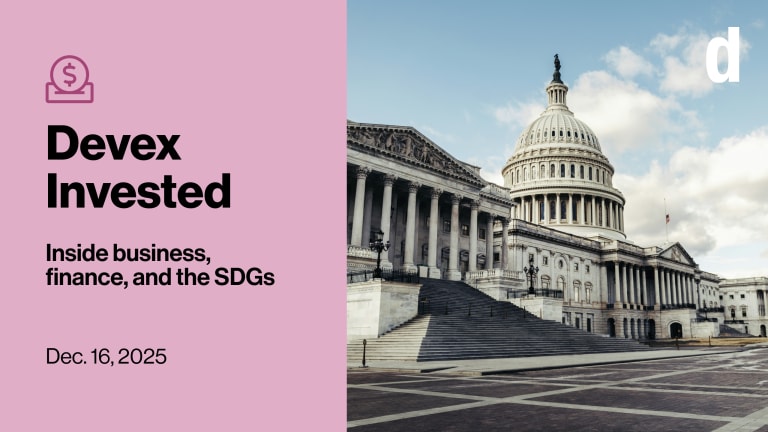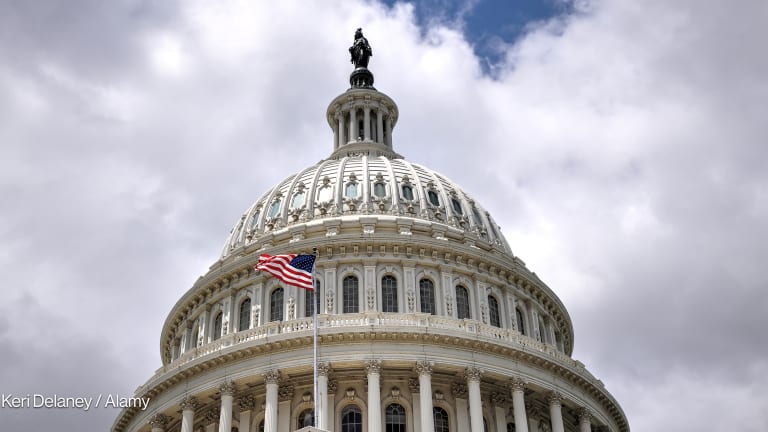
WASHINGTON — The U.S. International Development Finance Corporation has been officially operating for about six months, and while it has met some goals, other early actions have raised questions about how the agency is delivering on its development mandate and living up to its required transparency and accountability standards.
The first half-year has been busy for DFC, which has worked to set policies, is hiring additional personnel — it brought on its first chief development officer in February — and named its inaugural development advisory council last week.
Trump authorizes US DFC to invest in domestic COVID-19 response
The U.S. International Development Finance Corporation now has the authority to provide loans to boost domestic production in response to the pandemic. Development experts are questioning why an agency with an international development mandate was the right fit to manage the task.
The agency set up a $4 billion liquidity facility for existing clients to respond to the COVID-19 crisis, created a new health care investment initiative, and took on domestic responsibilities to administer loans through the Defense Production Act to build up U.S. supplies for the coronavirus response.
It has also approved about $2.3 billion in new projects, ranging from a $371,000 technical assistance grant for a dairy company in India to $250 million political risk insurance for supporting so-called blue bonds in Kenya.
Of the 33 projects that DFC has approved, it classifies 72% as going to low-income or lower-middle-income countries — surpassing its 60% target — though that includes some regional or global deals in which some funding might go to higher-income countries. Guatemala, Mexico, and St. Lucia are among the upper-middle-income countries where projects were funded. A project building a telecommunications cable connecting Singapore to other nations was the only investment in a high-income country, according to data that DFC provided.
DFC CEO Adam Boehler told Devex that he is pleased with the volume and mix of deals so far and that the investments made in higher-income countries have been focused on development. The system to determine a country’s income status can be easily skewed by a small population of wealthy individuals, as in Guatemala. “I won’t shy away because I still consider it a developing country,” he said.
Despite Boehler’s optimism, several development experts who work with and watch DFC have questions about whether it is living up to its development mandate and about its implementation of transparency and accountability steps required by the legislation that created the agency.
Transparency
DFC has multiple legal requirements regarding transparency and data — including publishing project-level data and reporting to foreignassistance.gov — that it has not yet fulfilled. Some development experts and advocates told Devex they are concerned about those public reporting requirements and worried that the agency has been less open and consultative about policies.
A number of early moves also raised questions about DFC’s level of openness. These include the approval of projects at its first board meeting, most of which were not for low-income or lower-middle-income countries; a decision not to comply with the Sunshine Act, a law meant to increase government transparency; and what some described as less engagement with the development community.
“We realize they’re standing up a new agency and have been hit by COVID. We understand they are up against a lot, but we want to make sure transparency stays a priority. And to me, right now that’s a question,” said Sally Paxton, U.S. representative for Publish What You Fund.
DFC is required to publish information to foreignassistance.gov on a quarterly basis but has not yet done so. Boehler said that the agency is working on it and noted that all the information is already available on its own website. Prior to Devex requesting the data in late May, DFC had not updated its public project database since the end of 2019, though information is now available through the end of March.
Paxton said that the information released about each project approved is minimal and that she would like to know whether the agency will publish development impact scores or development rationales for projects in the future. She also wants DFC to specify how it measures development impact and what metrics it will use.
“To me, the jury is still out if they will live up to the development mandate and set the gold standard for transparency. That hasn’t happened yet,” Paxton said.
Boehler is working with Chief Development Officer Andy Herscowitz to determine what information will be published for any given project, he said. There will likely be some details about “how developmental it is,” but the agency is unlikely to share an exact score, he added.
DFC is committed to transparency, Boehler said, and the decision not to abide by the Sunshine Act “was largely a technical matter.” The agency will have two public board meetings per year, provide public notice for environmental impact assessments, and release details about all active projects.
He noted that the agency opened a public comment period to seek input on whether it should change its policies and consider investing in nuclear energy — which Boehler said was not required.
Several of the development experts Devex spoke to said DFC has had less community and stakeholder engagement in the past six months than OPIC — the agency’s predecessor — had in its last year, when meetings of various groups providing policy feedback were frequent.
“I don’t know if it’s that we got through the phase of engaging with stakeholders and they need to get to business to stand it up, or the diversion of COVID, or a leadership change, but it’s not as important,” said George Ingram, a senior fellow at the Brookings Institution.
Boehler pushed back when asked about concerns over decreased engagement, saying that he and other senior leaders of the agency have spoken at a number of events.
But speaking invitations for Boehler to make his case and answer questions is “a much different engagement” than seeking community advice on concrete policy issues and having a more collaborative process of consultations, Ingram said.
“We understand they are up against a lot, but we want to make sure transparency stays a priority. And to me, right now that’s a question.”
— Sally Paxton, U.S. representative, Publish What You FundWhile there may have been some pause in engagement because of COVID-19 and a focus on building its portfolio, DFC has done “quite a bit,” Boehler said.
When asked about the agency’s stakeholder engagement policy — the BUILD Act requires DFC to develop a publicly available policy about “consultations, hearings, and other forms of engagement in order to provide for meaningful public participation in the Board’s activities” — Boehler said he was unaware of such a policy and would need to get back to Devex.
Accountability
DFC has also not released details about its new accountability mechanism. Accountability advocates are asking for more information and a voice in the process of creating the tool so that communities have the ability to raise complaints about projects’ adverse impacts.
DFC should develop a strong accountability mechanism to ensure it is not harming people, Stephanie Amoako, a senior policy associate at Accountability Counsel, told Devex. Rather than just copying OPIC’s mechanism, the agency should reflect on what has and has not worked and look at best practices from other institutions, she added.
“We want to see [it] implemented, but not in a ‘check the box, we did that’ way, but robustly implemented to reflect best practice and effectiveness,” she said.
Amoako called on the agency to set up a public consultation process about the mechanism that is advertised on the federal register and provides an opportunity for participants to look at the policies under consideration and respond to them. The European Bank for Reconstruction and Development, which recently reformed its accountability mechanism, can provide a good example of how a process could be managed, she said.
Some of the recommendations that Accountability Counsel has for a new mechanism are: allowing claims even after a project is completed, since negative impacts may not be immediately apparent; ensuring communities have knowledge of the mechanism; having a zero-tolerance policy for retaliation based on claims; and creating a remedy or redress fund to ensure resources are available in case a project creates harm.
“If the building blocks are not in place, there are a lot of risks that come from that,” she told Devex.
While the public hearing prior to the closed board meeting did not provide an opportunity for an exchange between organizations and DFC, Boehler later told Devex that the agency is working closely with the State Department to set up the mechanism and is in the midst of the process.
DFC hopes that the mechanism will be up and running in the next couple of months but does not yet have details to share, Boehler said, adding that he is interviewing inspector general candidates and aims to have the position filled soon.
Search for articles
Most Read
- 1
- 2
- 3
- 4
- 5








